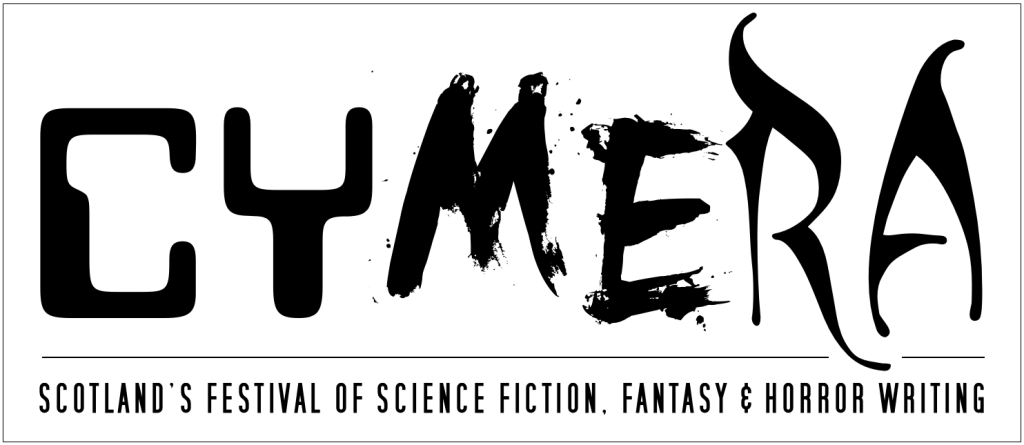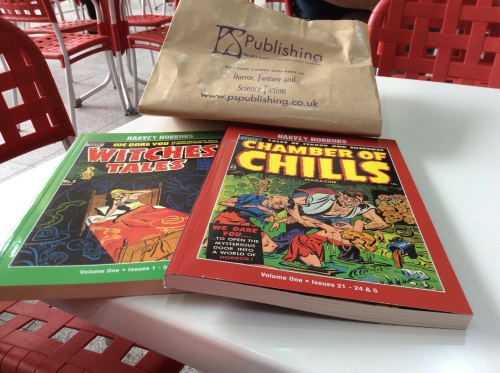This passed me by in previous years, but this year I was lucky to find out in time about the Cymera festival of fantasy, scifi and horror writing. It takes place in Edinburgh, but in recent years due to Covid has been online too. It took place in early June and I bought a digital weekend pass. This let me watch events streamed live, but more importantly let me also watch after on catchup. I had until today, 3rd July, to watch them, and have been putting in the time in recent weeks to get through as many as I could. Today I watched my last talk, my 22nd. This is a quite incredible tally for seriously ill me to have managed. And as someone with a very restricting neurological illness (I am mostly bedbound now, and asleep most of the time) it was a marvellous opportunity to watch and enjoy things from home at my own convenience that in the past you would have to be there in person to see.
I watched a huge list of panels and author chats, as listed below. Initially looking through the programme before the event I spotted 3-5 events that immediately jumped out to me. Events taking place live in Edinburgh that were streaming too, or Zoom chats that would be available to watch either live or on catchup for digital ticket holders later. However because I bought a digital weekend pass (£50, though available earlier at £40) I could watch *everything* recorded live and on catchup. And in practice I ended up watching way, way more than even I could hope. Not all the talks aired, but a huge number of them.
- Folkways with JJA Harwood and Kit Whitfield
- Cityscapes with Adrian Tchaikovsky, E.C. Hibbs and J.L. Worrad
- Expanding Universes with Aliette De Bodard and Ann Leckie
- Dead Weird with Gemma Amor, John McGlade and Heather Parry
- Unlikely Friendships with Travis Baldree and Heather Fawcett
- Haunted and Hunted with Fiona Barnett, Anya Bergman and Catriona Ward
- Catching Up With Helen Sedgwick
- War Stories with Gareth Hanrahan, Anna Smith Spark and Ian Whates
- The Epic’s New Clothes with Sharon Emmerichs, Juliet McKenna and Claire North
- It’s Grim up Norse with Thilde Kold Holdt, Shauna Lawless and Suzie Wilde
- N.K. Jemisin in conversation with Tasha Suri
- Daring Deeds with Justin Lee Anderson and Sebastien de Castell
- Adventures in Time and Space with A.G. Riddle and Gareth Worthington
- Catching Up With Silvia Moreno-Garcia
- Connection, Interrupted with Nina Allan, Cory Doctorow and Ian McDonald
- Catching Up With Brent Weeks
- Yesterday’s Tomorrow with Nicholas Binge and Christopher Priest
- New Scottish Stories with Paul Tonner, Letty Wilson and Ell J Walker
- Of Gods and Dragons with Amie Kaufman and L.R. Lam
- Dangerous Magics with Chelsea Abdullah and Hadeer Elsbai
- Underworld with C.K. McDonnell, Sarah Painter and Adam Simcox
- CyberJunk with M.R. Carey, Dave Cook and Ever Dundas
The order in which I watched the events above isn’t representative of what I was most intrigued by. I could flit from event to event, and saved some of the best to last. Many were two or three-author panels based around a theme with a chair person. Others were single author chats with a chair by Zoom.
The range of fantasy, scifi and horror writing covered was immense. There would rarely be a panel where I wouldn’t be adding titles to my book watch list, or even buying something immediately. Some authors I knew already, but I discovered many authors new to me, whose works I now want to read. And despite watching so many of author events I was impressed by how little overlap there was in terms of content. Every panel or chat would give me new insights and experiences into the writing process, as well as touch on the specific themes of that panel and introduce me to the writers and their books.
I would like to thank the organisers for allowing streamed access like this. It was so enabling for me, and as a reader and writer myself I am throughly inspired by having watched these. I would also like to thank the festival team for managing the technology and practicalities so well. This was a very smooth operation. I will definitely be back to watch next year. Though aiming to book my digital weekend earlier so I can benefit from the reduced early bird weekend pass price!


